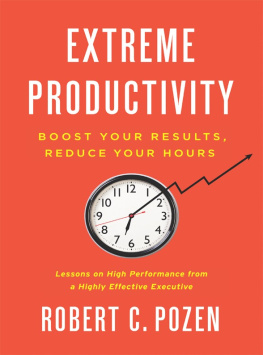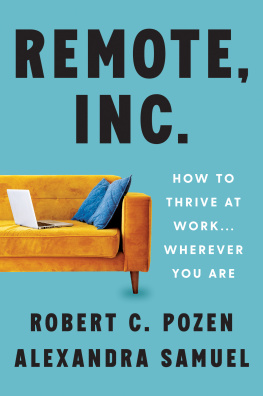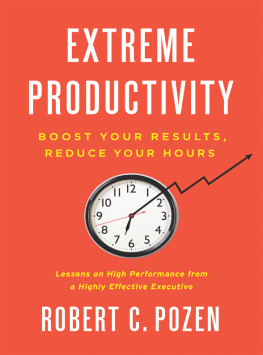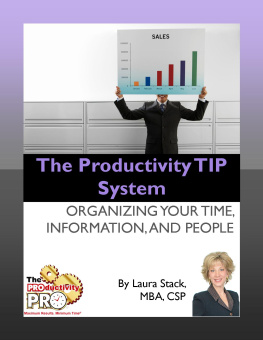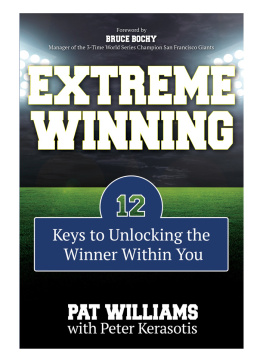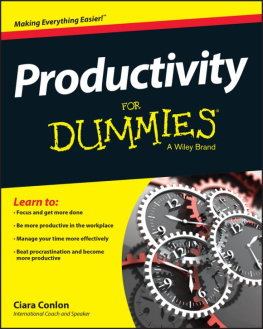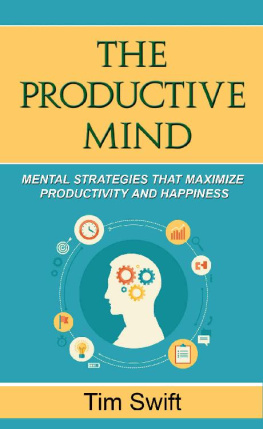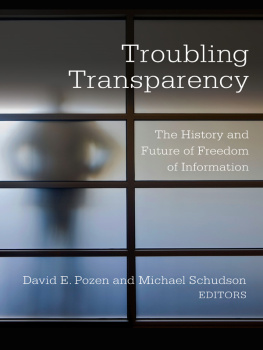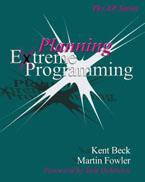Robert C. Pozen - Extreme Productivity
Here you can read online Robert C. Pozen - Extreme Productivity full text of the book (entire story) in english for free. Download pdf and epub, get meaning, cover and reviews about this ebook. publisher: HarperCollins, genre: Romance novel. Description of the work, (preface) as well as reviews are available. Best literature library LitArk.com created for fans of good reading and offers a wide selection of genres:
Romance novel
Science fiction
Adventure
Detective
Science
History
Home and family
Prose
Art
Politics
Computer
Non-fiction
Religion
Business
Children
Humor
Choose a favorite category and find really read worthwhile books. Enjoy immersion in the world of imagination, feel the emotions of the characters or learn something new for yourself, make an fascinating discovery.
- Book:Extreme Productivity
- Author:
- Publisher:HarperCollins
- Genre:
- Rating:3 / 5
- Favourites:Add to favourites
- Your mark:
- 60
- 1
- 2
- 3
- 4
- 5
Extreme Productivity: summary, description and annotation
We offer to read an annotation, description, summary or preface (depends on what the author of the book "Extreme Productivity" wrote himself). If you haven't found the necessary information about the book — write in the comments, we will try to find it.
Extreme Productivity — read online for free the complete book (whole text) full work
Below is the text of the book, divided by pages. System saving the place of the last page read, allows you to conveniently read the book "Extreme Productivity" online for free, without having to search again every time where you left off. Put a bookmark, and you can go to the page where you finished reading at any time.
Font size:
Interval:
Bookmark:
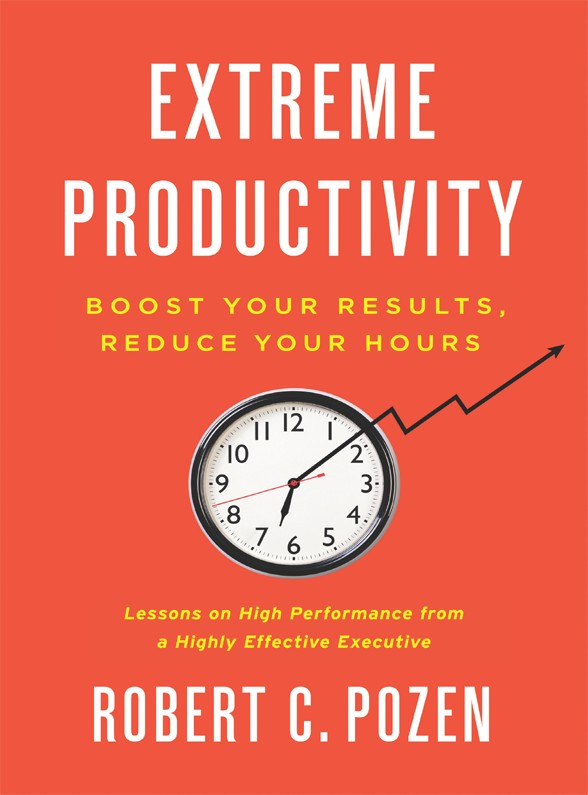

To my children, Joanna and David, who have given me so much love and support
I would like to give my sincere thanks to my friends and colleagues who took time out of their busy schedules to read some early drafts of this book. Their feedback and specific suggestions were truly helpful in shaping the books final version. Those seven readers are Beth Argy, Lena Goldberg, Theresa Hamacher, Jeremy Kagan, Peter Kaufman, Lauren Pyle, and Rich Weitzel. James Levine not only was a helpful reader of drafts but also did an excellent job as my literary agent.
I want to give special thanks to Kathy Holub, who helped edit the book. Through her efforts, the book is shorter, better organized, and more fun to read.
I would also like to thank the following people for reviewing a late-stage draft of the manuscript: Sara Petras, Rachel Branwen, Kathleen Miskiewicz, Maureen Leary-Jago, and Mary Ellen Hammond.
I want to express my special appreciation to MFS Investment Management, and especially Courtney Mahoney, for providing me with excellent administrative support for the book.
Finally, and most important, I am very grateful to Lucas Goodman, my brilliant research assistant. Lucas did a great job in researching a diverse array of topics, writing initial drafts of many sidebars, and integrating my many revisions into the manuscript. And he did all this quickly with great dedication and diplomacya wonderful example of personal productivity.
P eople often ask me how I get so much done. During most of the last five years, Ive held two full-time jobsserving as full-time chairman of MFS Investment Management and carrying a full teaching load at Harvard Business School. Ive also served on the governing boards of two publicly traded companies (Medtronic and Nielsen), a health care foundation (the Commonwealth Fund), and a medical research center (the Harvard NeuroDiscovery Center). At the same time, Ive managed to write three books (including this one) and publish roughly a hundred articles in newspapers and magazines. Through all this, Ive maintained a strong relationship with my wife of thirty-five years and our two children, as well as a wide network of friends and relatives.
Though these multiple roles did not seem unusual to me, the editors of the Harvard Business Review (HBR) were intrigued and asked if they could interview me about the secret recipe for my productivity sauce. When these interviews elicited a large positive response in the blogosphere, the HBR editors asked me to write a short article distilling my principles of productivity. I got even more enthusiastic reactions to that article. Strangers stopped me in airports to talk about productivity, and an MIT professor thanked me for improving his reading habits.
However, because the article only skimmed the surface of what can be said about personal productivity, I decided to write this book. In reflecting upon productivity over my career, I can point to a number of habits and methods that have helped me become successful. But even more critical was the realization early in my career that success comes not just from hard work and careful planningthough those are both important. Success depends in large part on a proper mind-set: focusing on the results you plan to achieve, rather than the number of hours you work. The results are what matter most to your employer, clients, and colleagues.
Lets begin with what I mean by personal productivity. I mean the quantity and quality of your results in achieving your own objectives. I wont attempt to dictate what those objectives should be, only that you should clearly articulate them and their relative priority. You may be looking to climb the corporate ladder as quickly as possible or seeking a better balance between your professional and personal lives. In either case, you will benefit by getting more done in the hours you work.
This book does not ask you to embrace a new philosophy of life in order to be successful. It does not even require you to adopt a totally integrated system for personal productivity. It contains specific and practical suggestions on how to increase your productivity at work. You can pick and choose whichever suggested techniques seem most helpful to you.
The suggestions in this book are much broader than those in the typical manual on time management, with its emphasis on mundane tasks such as organizing your files. Although time management is a significant component of productivity, it is not the only one. A useful set of recommendations on productivity should cover a wider range of topics, as this book doesfor example, on setting goals for your career and developing skills such as effective writing.
Most fundamentally, the book urges you to adopt a different mind-set as well as to follow concrete techniques. As I previously noted, in order to be productive, you have to focus on the results you want to achieve, not the time you spend at work. Unfortunately, this mind-set is directly at odds with the system of billable hours in accounting or law firms and the emphasis on hours logged at the office in most occupations.
Last, this book is not selling snake oil. In the 1830s, some authors suggested that one could succeed only by following a special diet, sleeping on a hard bed, or abstaining from masturbation! More recently, others have urged quick fixes like holding many short meetings or working only a few hours per week. There are no miracle cures in this book. Most of my recommendations call for rigorous thinking and disciplined behavior sustained over long time periods.
This book is organized into five main parts, each with two or three chapters. The end of each chapter includes specific and practical takeawayslessons to be learned.
Part I tells you the three big ideas underlying the rest of the booksetting goals with explicit priorities, focusing on the final results, and not sweating the small stuff.
Part II helps you implement your short-term priorities in a disciplined manner. It contains chapters on organizing your daily routine, managing your travel schedule, and running efficient meetings.
Part III helps you develop three key personal skills that are critical to becoming a successful professional. It contains chapters on improving your reading comprehension, writing abilities, and effectiveness in public speaking.
Part IV helps you navigate through the organizational challenges of personal productivity. It contains chapters on managing down by delegating functions and managing up by working well with your boss.
Part V provides you with a framework for making long-term decisions about your career. It contains chapters on maximizing your options, succeeding in a rapidly changing world, and achieving a satisfying work-life balance.
Ive written this book for all types of professionalsthose who primarily use their brains in their work. This includes accountants, computer programmers, doctors, engineers, investment bankers, lawyers, marketers, psychologists, real estate brokers, retailers, scientists, teachers, and so on. Although the majority of the books examples are drawn from the commercial world, most of its lessons apply to professionals in other types of organizations: not-for-profit institutions, academia, and government. No matter where you work, you probably face many of the same challenges in allocating your time, running meetings, and dealing with difficult bureaucracies.
Next pageFont size:
Interval:
Bookmark:
Similar books «Extreme Productivity»
Look at similar books to Extreme Productivity. We have selected literature similar in name and meaning in the hope of providing readers with more options to find new, interesting, not yet read works.
Discussion, reviews of the book Extreme Productivity and just readers' own opinions. Leave your comments, write what you think about the work, its meaning or the main characters. Specify what exactly you liked and what you didn't like, and why you think so.

